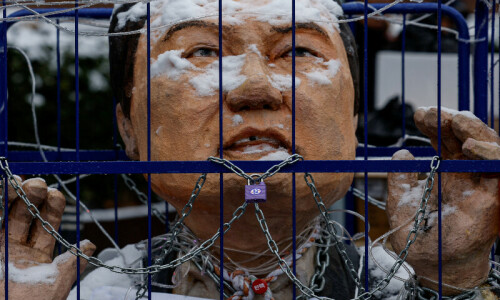Ghulam Fatima, 78, is a woman from the lower rungs of conservative Pakistani society who is running a family business on the streets of Islamabad.
Every morning, seven days a week, she leaves her rented house in a ghetto along the city’s western neighbourhood and heads to a wholesale fruit market on a motorbike driven by her son. She comes back with small crates of seasonal fruits, which she arranges on a cart that she has set up for drive-by customers in a quiet corner of the city’s D-12 residential sector.
She eyes every approaching vehicle as a potential customer and, when someone pulls up near the cart, she deals with them and sorts the pieces of different fruits according to their choice, before her son weighs and packs them up for them.
For many, Ghulam Fatima is someone who has broken the gender barriers of a traditional male-dominated society where women, especially those from the poor and lower-middle classes, are not allowed to operate in public spaces.
So, how is it that things have changed for her?
Economic hardship is leading to more and more women entering the workforce. How is this changing the way they consider public spaces and the conventional family?
The answer lies in the way the Pakistani economic landscape has evolved over the last five decades and how it has impacted the cultural values of different sections of the society.

“In a country dominated by a war economy and its resources monopolised by the military in league with feudal lords, attempts by the lower sections of the society to strive for land reforms, industrialisation, social welfare plans and workers’ right to labour unions have fallen by the wayside,” says Ismat Shahjahan, who heads a women’s rights organisation, the Women Democratic Front (WDF).
As a result, the country’s financial system has evolved into a foreign exchange-dependent consumer economy, with little social protection for vulnerable sections and widespread institutional corruption.
The consequences are there for everyone to see: one US dollar that was worth 9.99 Pakistani rupees in 1980 is valued at 285 rupees today.
Meanwhile, during this same period, the country’s population has grown from 80.62 million to 235.8 million, indicating the continued dependence of the poor on producing as much labour force as they can for their economic survival.
According to an official report released in 2022 by the Centre for Public Policy and Governance (CPPG), the informal economy — of which street vending is an important component — has a “68 percent share in the urban workforce of the country.”
Most of this workforce has origins in the rural areas and has moved to the cities for economic reasons. This is evident from the way the ratio of rural to urban population has gone down from 78 percent in 1960 to around 63 percent in 2021, according to the data provided by the World Bank.
Dr Kaisar Bengali, a veteran economist with 40 years of experience in teaching, research and policy advice, states two factors have driven women to abandon their traditional social roles and come out on the streets to work.
As things stand, Ghluam Fatima is the only one left to earn for the house and to provide treatment for her disabled son. And her only help is her as-yet-unmarried son, Niaz Hussain, who helps her with the fruit business and drives her to and back from work. A couple of married daughters whose families too have moved to Islamabad, drop by off and on to help her with domestic chores
“There is the pull factor, where women realise that there are better opportunities available outside, so why are they sitting at home?” he says. “These are mostly middle and lower-middle class women who seek jobs in schools, hospitals, hotels and similar locations to help sustain their shrinking family income.
“Then there is the push factor. When a family runs out of income, there is no adequate male manpower available and so the women are pushed to step out to search for economic opportunities. These are mostly lower-class women, driven by misery.”

Ghulam Fatima belongs to the second category.
She was born in 1945 in a family of tenant farmers in a village in Faisalabad district. She was the eldest among four sisters and one brother. The family lived in a shack given to them by a local feudal lord, whose fields her father tended. According to local norms, her mother, and later she herself as well as her siblings, worked as unpaid domestic help at the landlord’s house.
In keeping with rural customs, she was married off by her parents when she was barely 18. Her husband, Sakhi Mohammad, was also from a family of tenant farmers from a village in the Nankana Sahib area, some 90 kilometres to the east.
In the late 1970s, Sakhi Mohammad decided to move to Lahore city.
“He had been an active supporter of the then-popular Pakistan Peoples Party (PPP), and wanted to be close to some local party leaders who were based in Lahore,” she tells Eos. “He also said that labour wages were better in Lahore and would make life easy for us.”
In Lahore, Sakhi worked as a construction labourer while Ghulam Fatima took up her first paid job as a domestic servant.

Meanwhile, her husband would regularly attend political rallies of the PPP and, at times, she would also accompany him and raise slogans of ‘Jiye Bhutto’ [Long Live Bhutto, referring to Zulfikar Ali Bhutto, the country’s first elected prime minister].
During this period, she was able to marry off all her daughters and two of her sons.
But then bad times struck. Her husband developed black cataract in both eyes and became unable to work. The entire burden of feeding the family shifted to her shoulders.
Three years later, she decided to move the family to Islamabad, where one of her married sisters had settled and who had told her that there were better wages and less traffic on the streets.
During the last five years, her husband passed away and her two married sons left her and settled in their village in Nankana Sahib. Another son, who was a daily wage worker, suffered an electric shock in the head while climbing an electricity pole and has since been left disabled due to damage to his nerves and brain.
So, as things stand, she is the only one left to earn for the house and to provide treatment for her disabled son. And her only help is her as-yet-unmarried son, Niaz Hussain, who helps her with the fruit business and drives her to and back from work. A couple of married daughters
whose families too have moved to Islamabad, drop by off and on to help her with domestic chores.
Ironically, former jiyala Ghulam Fatima has repeatedly tried but failed to register for the Benazir Income Support Programme (BISP). They tell her that she doesn’t qualify.
In a nutshell, extreme poverty and the loss of domestic manpower are the reasons that have pushed Ghulam Fatima to compromise on old values and embark on an unconventional course for economic survival.
She is not alone in this predicament.
At another roadside spot in the E-11 sector of Islamabad, Kulsoom Begum, 40, can be seen shoving one sugarcane after another into her diesel-powered juicer machine, to supply vitamin-rich juice in disposable glasses to her drive-by customers.
Kulsoom Begum has faced several family and health setbacks as well. She was run over by a motorbike some three years ago, severely damaging her legs. She still walks with a limp. But what keeps her going is another tragedy she suffered some 15 years ago, when her husband, a construction worker, fell from a three-story building. He survived, but permanently damaged his backbone muscles.
“He can walk around a bit, but runs short of stamina very quickly, and so spends most of his time in bed,” she says.
Kulsoom Begum hails from a village in the Faisalabad region and was married into a family from a village in Gujranwala. All of her three sisters and three brothers are married and still living in the
village where her brothers work in brick kilns and the sisters weave carpets at home for local manufacturers.
But some eight years ago, she decided to move to Islamabad, “[because] life became increasingly difficult for us due to my husband’s health,” she says. “He couldn’t work anymore and, since daily wages in rural areas are too meagre, I alone could not earn enough money to provide food to my children, who were too young to work at that time.”
She chose Islamabad because some relatives who had set up a sugarcane juice stall in the city suggested that she could improve her family earnings here.
“I did that, and I think they were right,” she says.
Like Ghulam Fatima, she too has rented a house in another shanty town in Islamabad’s north-western outskirts, some five kilometres from her kiosk. She lives there with her husband, three teenage daughters and two minor sons.
Kulsoom earns anywhere between Rs 1,000 to Rs 2,000 a day, which she says is enough to put food on the table and also to save some for other expenses.
Her top priority now is to save enough money to marry off her eldest daughter, who has been engaged for over a year, and will be the family’s next source to produce its labour force for the future.
The writer is a veteran journalist who has been Executive Editor of the monthly Herald and Pakistan Editor of BBC English Online
Published in Dawn, EOS, July 16th, 2023














































Dear visitor, the comments section is undergoing an overhaul and will return soon.